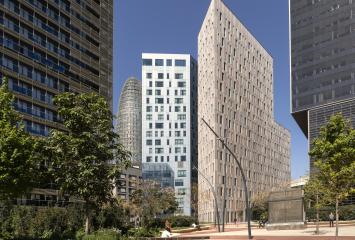Energetic Certification, a bet for the future
The real estate sector is immersed in changes where the sustainability and efficiency are setting the tempo of a new business seeking to adjust itself into incoming times.
Energy certification is not currently mandatory for office buildings, although having it could bring lots of benefits for the user.
What kind of guarantees does the energy certification offer?
Economical:
- Reduction of energy consumption in water, lighting and energy.
- Increase of property value. Having an energy certification allows to rise the income, besides being a claim for the occupation to increase.
- It boots employee satisfaction and productivity.
Social:
- Improves internal spaces in terms of acoustics, thermal and atmosphere.
- Enables the creation of more comfortable, safe and healthy spaces.
Environmental:
- Reduces CO2 emissions.
- Encourage the use of renewable energies.
Since there is no current legislation regulating the obligation of having an energy certification, it is real estate owners such as Colonial, the ones working with professionals in the sector to provide their office buildings with an energy certification that guarantees those benefits.
Main energetic certifications:
Colonial possesses 3 different types of international certifications in their buildings in order to evaluate the different factors that influence a building to be sustainable.
BREEAM certification
Born in the United Kingdom, BREEAM sizes up the impacts in 10 different categories: management, wellness, health, transport, energy, water, materials, waste, ecological land use, innovation and pollution; and gives them a final score that serves as a reference in the design, execution and maintenance phases of the building.
This certificate adapts to the type of building and its specific function in order to maximize its performance.
LEED Certification
LEED certificate aims to accelerate the implementation of sustainable construction. It is based on a line of credits, and the evaluated buildings obtain the certificate after passing a series of levels in which technical and administrative guidance are given.
According to the obtained credits, each building will obtain a LEED category or another. LEED Platinum category stands for buildings with an 81% of the total evaluation credits and the LEED Bronze category is granted for buildings 50%- 60% of the credits.
WELL Certification
The WELL certificate is mainly focus on health and well-being. Buildings with a WELL stamp, combine the best practices in design and construction, with a varied interventions in terms of users’ health and wellness.
The WELL certificate evaluates 7 different areas such as the sustainable management of water, air and building light, and categorize them in silver, gold and platinium.

